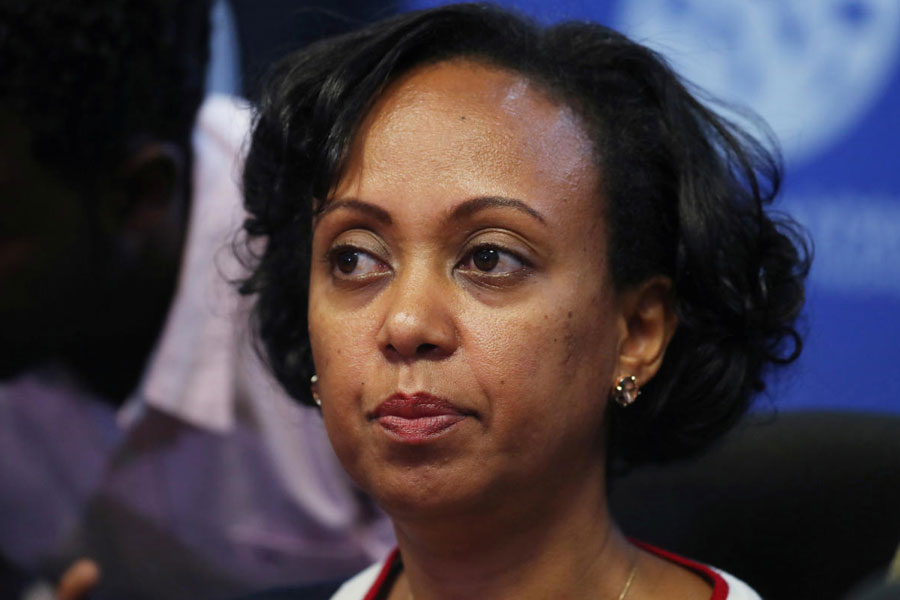
Fortune News | May 27,2023
Feb 11 , 2023
By Mamta Murthi
The COVID-19 pandemic has exposed the weaknesses and lack of preparedness of health systems globally. When the virus was at its peak, many low- and middle-income countries struggled to save lives while sustaining essential medical services such as maternal healthcare, routine childhood immunization, and the treatment of non-communicable diseases.
After this traumatic period, it is tempting to hope that the worst is behind us.
Unfortunately, the future will likely bring more frequent public-health crises, owing to climate change, urbanization, deforestation, water shortages, land-use changes, the transmission of pathogens from animals to humans, and conflict-induced fragility.
To limit the impact of the coming crises on lives and livelihoods, governments must take urgent action to boost the resilience of their health systems. According to a recent World Bank report, a resilient health system is integrated, enabling more rapid identification of threats and risk factors; agile, and thus able to respond quickly to evolving needs; absorptive, to contain shocks; and adaptive, to minimize health service disruptions.
The World Bank is working with low- and middle-income countries on this resilience agenda. Our 34 billion dollars global health portfolio includes more than 240 projects that help countries take a comprehensive approach to improve outcomes, especially for poor and vulnerable people, by strengthening primary care and key public-health functions. For example, in June 2022, the World Bank approved 258 million dollars for Pakistan's National Health Support Program, which aims to strengthen the health workforce and equip community health centres to respond better to emergencies and deliver quality services, particularly to the most vulnerable communities.
The newly created Pandemic Fund is an additional tool to fill critical gaps by helping channel much-needed financial support to developing countries as they shore up prevention and response measures and improve readiness before the next health crisis. Established with the support of the G20, the fund is governed by an inclusive board comprising representatives from sovereign donors, recipient-country governments, philanthropic foundations, and civil-society organizations. The Pandemic Fund has already secured pledges of 1.6 billion dollars, and the first round of funding has just been announced.
These additional, long-term resources will help countries strengthen their public health systems, raise risk awareness, improve early warning functions, and expand the number of community health workers. Strong risk communication and community engagement can increase trust and build the solid partnerships that underpin a swift and efficient crisis response.
As countries progress toward post-pandemic recovery, they face additional challenges such as inflation, debt sustainability, climate change, ageing populations, a high burden of chronic disease, and challenges to socioeconomic and gender equality. Resilient health systems can mitigate the impact of these challenges by improving the readiness of services to prevent and manage other health crises and by strengthening essential functions.
Needs and approaches will vary across countries and regions.
For example, Cambodia, located in a hotspot for emerging infectious diseases, plans to enhance multisectoral collaboration to incorporate human, animal, and environmental health. Kenya seeks to bolster its surveillance and laboratory capacity for infection control. And Bangladesh aims to increase the capacity of its health facilities, workforce, and microbiology laboratories for coping with future pandemics.
Around the world, robust health governance and strong public-health institutions, backed by stable legal and regulatory frameworks, will be crucial to ensure evidence-based decision-making and crisis planning. Countries will also need to create fiscal space and attract and use external resources wisely, with the understanding that investing in integrated and resilient systems will deliver the greatest impact.
The most cost-effective investments strengthen public-health functions, health promotion, disease prevention, and primary health-care services, thereby minimizing healthcare cost when shocks hit. By preventing the much larger costs associated with public health emergencies, such outlays yield long-term dividends.
Building resilience requires partnerships within and beyond the health sector, as well as engagement with civil society and the private sector, which played an important role in the COVID-19 response. Protecting against health shocks also involves boosting research capacity and embracing innovation by fast-tracking new medical technologies or expanding digital technology in healthcare delivery.
The healthcare past crises offer valuable lessons and show what can be achieved. For example, the Ebola outbreak of 2014-16, which killed more than 11,000 people in West Africa, accelerated the establishment of the Africa Centers for Disease Control & Prevention across the continent, improving the region's surveillance and monitoring capacities.
As the COVID-19 pandemic wanes, this, too, is no time for complacency. We have all witnessed the pandemic's devastating effects. The World Health Organization estimated that nearly 15 million excess deaths worldwide in 2020 and 2021 could be attributed to COVID-19, which has also undermined hard-won gains in poverty reduction, education, health, and gender equality.
Enhancing resilience and readiness requires decisive action. With more crises sure to come, countries that make the right political choices for lasting and sustained policies will now be in the best position to protect the health of their populations and economies.
PUBLISHED ON
Feb 11,2023 [ VOL
23 , NO
1189]


Fortune News | May 27,2023

Fortune News | Dec 19,2020

Radar | Mar 04,2023


Commentaries | Dec 26,2020

Viewpoints | Jun 22,2024

Fineline | Apr 12,2020

Obituary | Mar 13,2021

Viewpoints | Feb 27,2021

Sunday with Eden | Nov 16,2019

My Opinion | 131819 Views | Aug 14,2021

My Opinion | 128203 Views | Aug 21,2021

My Opinion | 126147 Views | Sep 10,2021

My Opinion | 123767 Views | Aug 07,2021

Dec 22 , 2024 . By TIZITA SHEWAFERAW
Charged with transforming colossal state-owned enterprises into modern and competitiv...

Aug 18 , 2024 . By AKSAH ITALO
Although predictable Yonas Zerihun's job in the ride-hailing service is not immune to...

Jul 28 , 2024 . By TIZITA SHEWAFERAW
Unhabitual, perhaps too many, Samuel Gebreyohannes, 38, used to occasionally enjoy a couple of beers at breakfast. However, he recently swit...

Jul 13 , 2024 . By AKSAH ITALO
Investors who rely on tractors, trucks, and field vehicles for commuting, transporting commodities, and f...

Jul 5 , 2025
Six years ago, Ethiopia was the darling of international liberal commentators. A year...

Jun 28 , 2025
Meseret Damtie, the assertive auditor general, has never been shy about naming names...

Jun 21 , 2025
A well-worn adage says, “Budget is not destiny, but it is direction.” Examining t...

Jun 14 , 2025
Yet again, the Horn of Africa is bracing for trouble. A region already frayed by wars...

Jul 6 , 2025 . By BEZAWIT HULUAGER
The federal legislature gave Prime Minister Abiy Ahmed (PhD) what he wanted: a 1.9 tr...

Jul 6 , 2025 . By YITBAREK GETACHEW
In a city rising skyward at breakneck speed, a reckoning has arrived. Authorities in...

Jul 6 , 2025 . By NAHOM AYELE
A landmark directive from the Ministry of Finance signals a paradigm shift in the cou...

Jul 6 , 2025 . By NAHOM AYELE
Awash Bank has announced plans to establish a dedicated investment banking subsidiary...